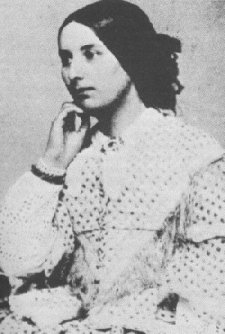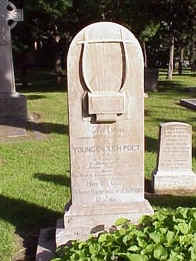
Forgive me if I start this post out on something totally Off Topic (as I often do!), but I had to share the link to these Pirates of the Caribbean dolls which someone sent me this week! They are so wonderfully funny and–weird. I’d like to at least have the Orlando doll to keep on my desk, but what I would really love is to have a whole set. Then I could act out scenes from the movie. Maybe the next time I have a few hundred dollars to spare…
And now onto the topic of the week!
For the last couple of weeks, I’ve been doing some volunteer work at a political campaign office, getting ready for the Super Tuesday primary on February 5. It’s mostly answering phones, stuffing envelopes, handing out bumper stickers and yard signs–not hugely glamorous. But it’s made me think about Georgiana, Duchess of Devonshire, and her Whig friends in the 18th century. And about how political campaigns have–and haven’t–changed in 200+ years.
“Ladies who interest themselves so much in the case of elections, are perhaps too ignorant to know that they meddle with what does not concern them” –The Morning Post, March 1784.
Georgiana first met Charles James Fox in 1777, when he visited Chatsworth. At 28, he was already marked out as the future leader of the Whigs. Until then his political career had veered between success and failure, and Georgiana spent her time flitting around, partying and racking up debts. But they both wanted, and were capable, of much more. They spent that visit discussing ideas. Fox instilled in Georgiana a devotion to the Whigs, who by the 1770s stood for opposition to the King, mistrust of powers of the crown, and vigilance over civil liberties.
“One day last week, her Grace the Duchess of Devonshire appeared on the hustings at Covent Garden. She immediately saluted her favorite candidate, the Hon. Charles James Fox” –The Morning Post, September 25, 1780
Georgiana began following the debates in Parliament and perfecting her skills as a political hostess. She became the leader of an elite group of political females that included her sister Harriet Ponsonby, the Duchess of Portland, Lady Jersey, Lady Carlisle, Mrs. Bouverie, and the Waldegraves, yet none ever outshown her, or came in for the extent of criticism she did.
In 1780, Richard Brinsley Sheridan (playwright, politician, and lover of Georgiana’s sister Harriet) asked for Georgiana’s help. She arranged for him to stand in the Spencer-dominated borough of Stafford (he was elected, natch). A week later, on Sept. 25, Fox asked her to accompany him as he contested the borough of Westminster. In this case, she only stood on the platform for a few minutes, but the press was Shocked.
“The Duchess of Devonshire’s attendance at Covent Garden, perhaps, will not secure Mr. Fox’s election; but it will at least establish her pre-eminence above all other beauties of that place, and make her a standing toast in all the ale-houses and gin-shops of Westminster” –Morning Post, April 8, 1784
In 1782, the Whigs came to power with Fox as Foreign Secretary. Under Parliamentary rules, MPs selected for office had to re-offer themselves to their constituents, and Fox again asked Georgiana to help him out. He wanted her to lead a women’s delegation, and on April 3 she performed her first official duty for the party. She and the other ladies, wearing Whig colors of buff and blue, spoke under large banners reading ‘Freedom and Independence’ and ‘The Man of the People.’ She was a sensation. Fans bearing her portrait sold in the hundreds.

Her involvement in politics only grew after the birth of her first child (Little G) in 1784. The Duc de Chartres and his French delegation treated her as their official hostess; her influence with the Prince of Wales was well-known. But also in 1784, the Whigs were low in public opinion as they formed a Coalition against Prime Minister Pitt and the King. In March, Pitt called a general election, setting off a storm of campaigning.
On March 17, Georgiana appeared at the opera, to much cheering–and booing and hissing. The Duchess of Rutland, a Tory hostess, stood up in her box and shouted, “Damn Fox!” In reply, Lady Maria Waldegrave leaped up and retorted, “Damn Pitt!” This must have been highly entertaining! The most noise I’ve ever heard at the opera was once when the guy sitting behind me fell asleep and started snoring.
“The Duchess made no scruple of visiting some of the humblest of electors, dazzling and enchanting them by the fascination of her manner, the power of her beauty, and the influence of her high rank” –Horace Walpole

But Georgiana also suffered threats and abuse as she went about her campaigning. By the end of her first week, she was exhausted and hoarse, with blistered feet. Fox was still behind in the polls. Georgiana wrote to her mother Lady Spencer, “I gave the Election quite up, and must lament all that has happened.” The Pittite papers, like the Morning Herald, reported that she exchanged kisses for votes, and scurrilous cartoons appeared. (She sent deputies out to buy up the most offensive of them as soon as they appeared!). Fox did eventually score a victory, and Carlton House saw nights of celebratory balls and dinners.
Until the next election…
Have you ever done any work in politics? And where can I get one of those blue suits Keira Knightley has on in the film still? I LOVE that costume!







